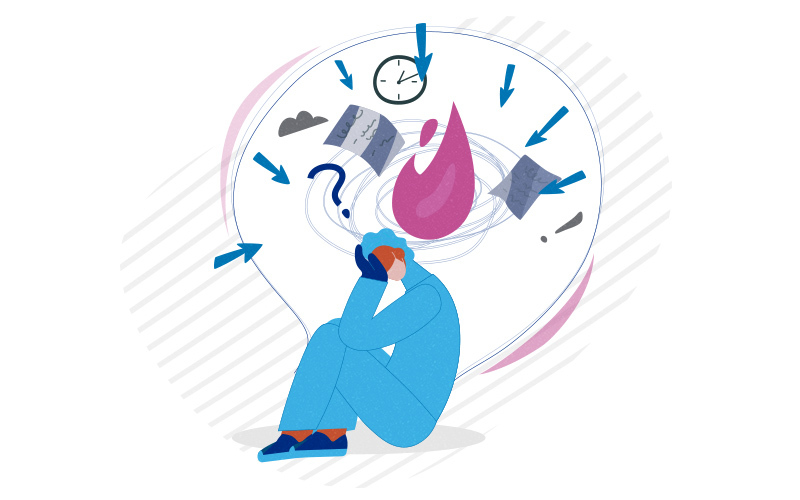Escaping the fire: How mental health care providers can fight burnout

It might feel like an occupational buzzword lately, but “burnout” is nothing new. It has plagued clinicians and other medical professionals for decades, but the COVID-19 pandemic and intensely spotlighted behavioral health crisis have only fueled the inferno. And maybe no one knows this better than the mental health professionals who have been on the frontline of both battles.
Psychiatrists, psychologists, social workers, and others have taken on the challenges of a nation in peril, all while facing the same vulnerabilities and distress as those they’ve committed to helping. The effect is jarring: A 2020 study shows that 78 percent of surveyed psychiatrists report feeling burned out. This statistic begs a few questions, including:
- How does provider burnout affect care delivery to those in need of mental health services?
- What can providers do to protect themselves from burnout?
For answers, we spoke with Lauren Coyne, a nurse practitioner and social worker with the Office of Clinician Support at Boston Children’s Hospital.
“Burnout is not one size fits all,” Coyne says. “It’s specific to the individual, both in how it can present and how to best manage it.”
Finding a cause
Defining burnout
Burnout is an occupation-related syndrome encompassing emotional exhaustion, detachment, and a reduced sense of personal accomplishment. It’s accompanied by feelings of emotional stress and job-related discouragement. The combination of these markers contributes to a heightened inability to express compassion and empathy for others.
Historically, burnout has been seen as influenced by an interaction between internal and external factors: Internal factors such as high self-expectations and perfectionism, and external factors such as increased caseloads and budgetary constraints that lead to decreased resources, staffing, and reimbursement.
Over the last two years, though, external factors have come to the foreground. For mental health professionals, the pandemic has been a pervasive concern among their patients as well as a logistical problem.
“There are a lot of parents working in health care,” Coyne says. “And a huge issue relating to burnout has been how COVID-19 precautions around staffing and time in the office affect their ability to do their job — mental health professionals included.”
Burnout’s effect on mental health care delivery
Provider burnout poses a systemic threat to the mental health care workforce for multiple reasons: Primarily, it’s a significant factor in providers leaving the practice without enough new clinicians to take their place. Coupled with the nearly 20 percent increase in demand for certain mental health services over the last year and a half, the result is significant delays in patients receiving essential care.
An additional consequence of burnout is its impact on the quality of care mental health professionals can provide. Longer hours, increased caseloads, and less time to decompress between appointments can leave providers less able to recharge after client sessions and mentally exhausted.
Preventive measures
Despite how it may feel, there are ways to prevent burnout.
Coyne says it can be hard for providers to issue the same care and kindness to themselves as they do to their patients. And while mental health professionals are adept at helping patients initiate self-care practices, taking their own advice is easier said than done.
“We’re hard on ourselves,” Coyne says. “There are a lot of ‘shoulds’ in health care.” Shoulds include feeling the need to take on every caseload or administrative task and feeling inadequate when unable to meet every daily demand.
Coyne suggests a few self-care tips for providers experiencing symptoms of burnout:
- Maintain the basics of good hygiene, a healthy diet, regular exercise, and a solid sleep routine, which includes limiting alcohol and screen time before bed
- Aim for 30 minutes of aerobic exercise four or five times a week
- Do something that makes you feel good, such as a hobby or project
- Make time for friends and family
- Get outside
- Seek professional help when you see signs of burnout
Coyne stresses the importance of finding a support system or group that can relate to your situation and can serve as an outlet to discuss challenges and emotions. That’s why she and others in the Office of Clinician Support at Boston Children’s work to ensure that the hospital’s clinical staff can access such support systems and resources to help manage work-related or personal concerns. The staff also helps facilitate crisis management within units and departments. They also provide a confidential and impartial space for clinicians to voice concerns and evaluate situations.
“Health care is delicate and requires motivation and an awareness of working for the greater good,” says Coyne. “We aim to be a safe space for providers to find what they need to maintain or reclaim their sense of self and purpose.”
Read more about provider burnout and the Office of Clinician Support.
Related Posts :
-

Burnout from COVID-19: What clinicians should know
Many clinicians are already all too familiar with the extreme exhaustion and stress associated with burnout. According to one recent ...
-

Tapping into the mind-body connection to reduce COVID-19 stress
In a dimly lit living room, a staff member lies on a couch, eyes closed, as soft music floats through ...
-

New research shows caregiver instability affects development
According to some estimates, more than 100 million children around the world experience separations from their caregiver every year. Previous research — ...
-

Team spirit: How working with an allergy psychologist got Amber back to cheering
A bubbly high schooler with lots of friends and a passion for competitive cheerleading: On the surface, Amber’s life ...





